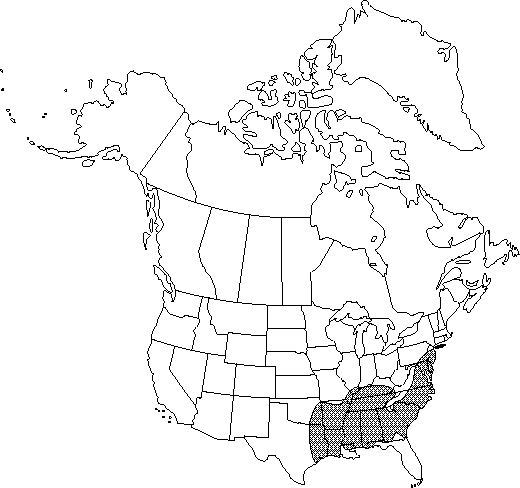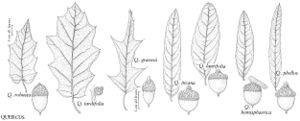Difference between revisions of "Quercus phellos"
Sp. Pl. 2: 994. 1753.
FNA>Volume Importer |
imported>Volume Importer |
||
| (7 intermediate revisions by 2 users not shown) | |||
| Line 9: | Line 9: | ||
|common_names=Willow oak | |common_names=Willow oak | ||
|special_status={{Treatment/ID/Special_status | |special_status={{Treatment/ID/Special_status | ||
| + | |code=W1 | ||
| + | |label= | ||
| + | }}{{Treatment/ID/Special_status | ||
|code=E | |code=E | ||
|label=Endemic | |label=Endemic | ||
}}{{Treatment/ID/Special_status | }}{{Treatment/ID/Special_status | ||
|code=F | |code=F | ||
| − | |label= | + | |label=Illustrated |
| − | |||
| − | |||
| − | |||
}} | }} | ||
|basionyms= | |basionyms= | ||
| Line 27: | Line 27: | ||
}}<!-- | }}<!-- | ||
| − | --><span class="statement" id="st- | + | --><span class="statement" id="st-undefined" data-properties=""><b>Trees,</b> deciduous, to 30 m. <b>Bark</b> dark gray and smooth, becoming darker and irregularly fissured with age, inner bark light orange. <b>Twigs</b> reddish brown, 1-2 mm diam., glabrous. <b>Terminal</b> buds chestnut brown, ovoid, 2-4 mm, apex acute, glabrous. <b>Leaves</b>: petiole 2-4(-6) mm, glabrous, rarely sparsely hairy. <b>Leaf</b> blade linear to narrowly elliptic, usually widest near middle, 50-120 × 10-25 mm, base acute, margins entire with 1 apical awn, apex acute; surfaces abaxially pale green, glabrous, rarely softly pubescent, adaxially light green, glabrous. <b>Acorns</b> biennial; cup shallowly saucer-shaped, 3-6.5 mm high × 7.5-11 mm wide, covering 1/4-1/3 nut, outer surface puberulent, inner surface light brown, pubescent, scale tips tightly appressed, acute; nut ovoid to hemispheric, 8-12 × 6.5-10 mm, often striate, glabrate, scar diam. 4.5-6 mm.</span><!-- |
-->{{Treatment/Body | -->{{Treatment/Body | ||
| Line 34: | Line 34: | ||
|elevation=0-400 m | |elevation=0-400 m | ||
|distribution=Ala.;Ark.;Del.;D.C.;Fla.;Ga.;Ill.;Ky.;La.;Md.;Miss.;Mo.;N.J.;N.Y.;N.C.;Okla.;Pa.;S.C.;Tenn.;Tex.;Va. | |distribution=Ala.;Ark.;Del.;D.C.;Fla.;Ga.;Ill.;Ky.;La.;Md.;Miss.;Mo.;N.J.;N.Y.;N.C.;Okla.;Pa.;S.C.;Tenn.;Tex.;Va. | ||
| − | |discussion=<p>Individual trees with leaves softly pubescent abaxially may be classified as Quercus phellos forma intonsa Fernald; however, such leaves are known to occur on second-flush shoots from twigs bearing typical leaves.</p><!-- | + | |discussion=<p>Individual trees with leaves softly pubescent abaxially may be classified as <i>Quercus phellos</i> forma intonsa Fernald; however, such leaves are known to occur on second-flush shoots from twigs bearing typical leaves.</p><!-- |
| − | --><p>Quercus phellos reportedly hybridizes with Q. coccinea (W. W. Ashe 1894); with Q. ilicifolia (= Q. ×giffordi Trelease) and Q. incana (E. J. Palmer 1948); and with Q. marilandica, Q. nigra, Q. pagoda (= Q. ×ludoviciana Sargent), Q. palustris, Q. rubra, Q. shumardii, and Q. velutina. D. M. Hunt (1989) cited evidence of hybridization also with Q. hemisphaerica, Q. imbricaria, Q. laurifolia, and Q. pumila.</p> | + | --><p><i>Quercus phellos</i> reportedly hybridizes with <i>Q. coccinea</i> (W. W. Ashe 1894); with <i>Q. ilicifolia</i> (= Q. ×giffordi Trelease) and <i>Q. incana</i> (E. J. Palmer 1948); and with <i>Q. marilandica</i>, <i>Q. nigra</i>, <i>Q. pagoda</i> (= Q. ×ludoviciana Sargent), <i>Q. palustris</i>, <i>Q. rubra</i>, <i>Q. shumardii</i>, and <i>Q. velutina</i>. D. M. Hunt (1989) cited evidence of hybridization also with <i>Q. hemisphaerica</i>, <i>Q. imbricaria</i>, <i>Q. laurifolia</i>, and <i>Q. pumila</i>.</p> |
|tables= | |tables= | ||
|references= | |references= | ||
| Line 44: | Line 44: | ||
-->{{#Taxon: | -->{{#Taxon: | ||
name=Quercus phellos | name=Quercus phellos | ||
| − | |||
|authority=Linnaeus | |authority=Linnaeus | ||
|rank=species | |rank=species | ||
| Line 58: | Line 57: | ||
|publication title=Sp. Pl. | |publication title=Sp. Pl. | ||
|publication year=1753 | |publication year=1753 | ||
| − | |special status=Endemic; | + | |special status=W1;Endemic;Illustrated |
| − | |source xml=https:// | + | |source xml=https://bitbucket.org/aafc-mbb/fna-data-curation/src/2e0870ddd59836b60bcf96646a41e87ea5a5943a/coarse_grained_fna_xml/V3/V3_947.xml |
|genus=Quercus | |genus=Quercus | ||
|section=Quercus sect. Lobatae | |section=Quercus sect. Lobatae | ||
|species=Quercus phellos | |species=Quercus phellos | ||
| − | |||
| − | |||
| − | |||
| − | |||
| − | |||
| − | |||
| − | |||
| − | |||
| − | |||
| − | |||
| − | |||
| − | |||
| − | |||
| − | |||
| − | |||
| − | |||
| − | |||
| − | |||
| − | |||
| − | |||
| − | |||
| − | |||
| − | |||
| − | |||
| − | |||
| − | |||
| − | |||
| − | |||
| − | |||
| − | |||
| − | |||
| − | |||
| − | |||
| − | |||
| − | |||
| − | |||
| − | |||
| − | |||
| − | |||
| − | |||
| − | |||
}}<!-- | }}<!-- | ||
-->[[Category:Treatment]][[Category:Quercus sect. Lobatae]] | -->[[Category:Treatment]][[Category:Quercus sect. Lobatae]] | ||
Latest revision as of 21:52, 5 November 2020
Trees, deciduous, to 30 m. Bark dark gray and smooth, becoming darker and irregularly fissured with age, inner bark light orange. Twigs reddish brown, 1-2 mm diam., glabrous. Terminal buds chestnut brown, ovoid, 2-4 mm, apex acute, glabrous. Leaves: petiole 2-4(-6) mm, glabrous, rarely sparsely hairy. Leaf blade linear to narrowly elliptic, usually widest near middle, 50-120 × 10-25 mm, base acute, margins entire with 1 apical awn, apex acute; surfaces abaxially pale green, glabrous, rarely softly pubescent, adaxially light green, glabrous. Acorns biennial; cup shallowly saucer-shaped, 3-6.5 mm high × 7.5-11 mm wide, covering 1/4-1/3 nut, outer surface puberulent, inner surface light brown, pubescent, scale tips tightly appressed, acute; nut ovoid to hemispheric, 8-12 × 6.5-10 mm, often striate, glabrate, scar diam. 4.5-6 mm.
Phenology: Flowering spring.
Habitat: Of bottomland flood plains, also on stream banks, dunes, and terraces, and, occasionally, on poorly drained uplands
Elevation: 0-400 m
Distribution

Ala., Ark., Del., D.C., Fla., Ga., Ill., Ky., La., Md., Miss., Mo., N.J., N.Y., N.C., Okla., Pa., S.C., Tenn., Tex., Va.
Discussion
Individual trees with leaves softly pubescent abaxially may be classified as Quercus phellos forma intonsa Fernald; however, such leaves are known to occur on second-flush shoots from twigs bearing typical leaves.
Quercus phellos reportedly hybridizes with Q. coccinea (W. W. Ashe 1894); with Q. ilicifolia (= Q. ×giffordi Trelease) and Q. incana (E. J. Palmer 1948); and with Q. marilandica, Q. nigra, Q. pagoda (= Q. ×ludoviciana Sargent), Q. palustris, Q. rubra, Q. shumardii, and Q. velutina. D. M. Hunt (1989) cited evidence of hybridization also with Q. hemisphaerica, Q. imbricaria, Q. laurifolia, and Q. pumila.
Selected References
None.
